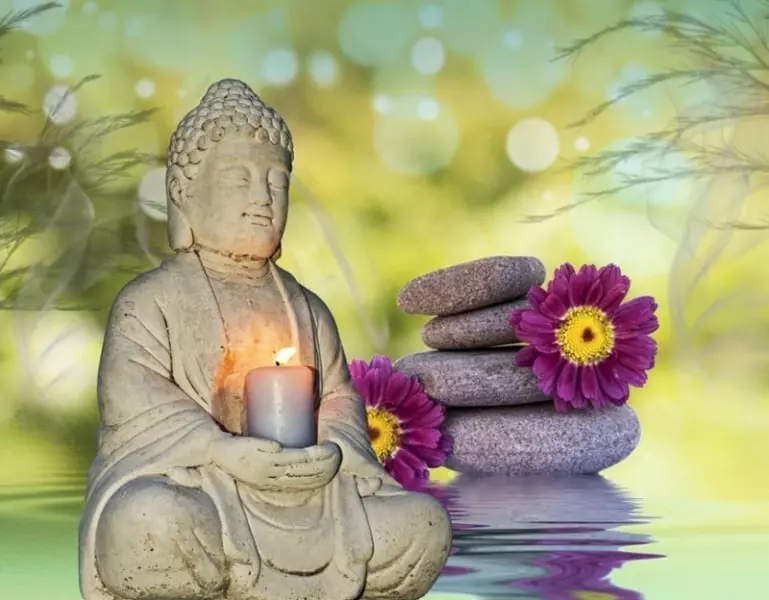Our home is undoubtedly the space where we need the energy to flow in the best way possible. That is why it is important to understand what Feng Shui is, what it's for, and how to apply it in your home.
 Image: Woman synchronizing with Feng Shui in her home
Image: Woman synchronizing with Feng Shui in her home
Feng Shui is an ancient Oriental philosophical system that studies the flow of energy to achieve conscious occupation of space. Its goal is to generate positive and harmonious energetic influence so that those who inhabit those spaces feel satisfied and have a better quality of life.
The term Feng Shui literally means "wind and water" since it initially studied the changes in nature, such as those related to climate and celestial bodies.
Feng Shui has many aspects and deeply analyzes the arrangement and content of each space we inhabit, making it difficult to fully encompass. However, there are three fundamental aspects that you must know to understand this philosophy of Feng Shui that is essential in the home.
The Chi or Vital Energy
In Chinese culture, everything that is part of the physical world is endowed with a "vital energy" called chi or qi. Its flow is modified according to the arrangement of space and the orientation of objects, aiming to generate positive energy in our lives.
The chi is divided into two elements, which are also crucial to understanding Feng Shui:
The Yin and Yang
The concept of Yin and Yang is well-known and takes on a special dimension in Feng Shui. Yin and Yang are opposite but interdependent and complementary elements: if there is one, there is the other.
According to Chinese cosmogony, Yin and Yang are present in everything that makes up the Universe, as absolutely everything has a face and a reverse side.
In the case of chi, it also has two aspects, a positive and a negative one. The idea of Feng Shui is to highlight the "good chi" over the bad. Good chi flows smoothly, bringing good luck, happiness, and prosperity. On the other hand, bad chi brings bad luck and financial difficulties if it stagnates or moves so quickly that it fades immediately.
The Bagua Map
The Bagua map is an eight-sided Feng Shui drawing that indicates the correspondence between the cardinal points and the different energy circuits. Bagua means "eight trigrams" in Chinese, and each one corresponds to a series of elements: an orientation, a part of nature, a part of our body, a family member, etc.
In interior design, the most important thing is to know which direction of the house or space is related to what type of energy:
- North: career, work, and life. Flowing water. Kidney, bones, vulva, and ears.
- Northeast: self-knowledge, intellect, connections. Earth, globe. Stomach, chest, hands.
- East: ancestors, family, health. Wood, plants. Ligaments, legs, feet.
- Southeast: finances, fortune, prosperity. Wood and water sources. Bones, hips.
- South: prestige, reputation, recognition. Fire. Heart, arteries, eyes.
- Southwest: relationships, love. Earth. Chest, stomach, internal organs.
- West: creativity, children, money. Metal. Nose, hair, mouth.
- Northwest: travel, friends, benefactors. Metal. Lungs, skin, head.
If we consider the floor plan of a house, the Bagua map would look something like this:
 Image: Feng Shui symbol
Image: Feng Shui symbol
10 General Elements of Feng Shui
Taking into account the above, the important thing for Feng Shui is to harmonize the elements of the home and spaces in such a way as to allow the chi to flow freely and accumulate good chi instead of bad.
To achieve this, Feng Shui uses different elements that, if used correctly, can completely change the energy of your home.
-
Light: Sunlight is the natural generator of energy and the most powerful. Therefore, if you want your home or space to be filled with good energy, it is essential to allow sunlight to enter. For artificial lighting, it is best to use warm and vibrant colored candles such as orange and yellow. It is crucial to avoid dark and enclosed spaces as they impede the proper flow of energy.
-
Colors: Colors in Feng Shui are related to the five elements of nature. Knowing how to use them correctly is vital for the free flow of chi in your spaces. Some color associations include:
- Blue: water. Symbolizes peace, cleanliness, and is perfect for bedrooms.
- Red: fire. Symbolizes passion, joy, and is ideal for living rooms or game rooms.
- Brown: earth. Represents balance, security, and comfort, perfect for spaces of relaxation.
- White: metal. Symbolizes strength, resistance, individuality, and is ideal for studies or home offices.
- Green: wood. Represents nature, abundance, vitality, and tranquility, perfect for bedrooms, living rooms, bathrooms, or children's rooms.
-
Decorations: Decorations are important in Feng Shui. Choose cheerful decorations that do not transmit negative feelings. Avoid collecting antiques as they carry the energetic history of the previous owners and places they have been. Decorations should be minimal and functional, and rounded objects are better for energy flow.
-
Hallways: Hallways should be easy to navigate and free of significant obstacles to allow energy to flow freely. Avoid placing furniture that blocks the passage.
-
Order: Disorder is never good for the home. It not only makes your home look neglected but also hinders the free flow of energy. A tidy home is a home with good energy.
-
Plants: Plants have many benefits according to Feng Shui. They balance the five elements, attract love, and increase learning capacity. They also help reduce stress and provide positive energy to the home. Some recommended plants include bamboo, which is considered a source of prosperity and energy for the home.
-
Sounds: Music, especially instrumental and mantras, can fill your home with positive and harmonious energy. Adding wind chimes or mobiles that produce pleasant sounds can also enhance the energy flow.
-
Doors and Windows: The flow of energy enters through the entrance door, so it is important not to have more than one. Windows can help with energy flow as long as they are clean and let in light. However, it is recommended to put curtains on your windows to prevent energy from escaping.
-
Floors: To ensure the free movement of energy throughout the house, it is best to have uniform flooring instead of dividing it into different materials or patterns.
-
Objects to Avoid: Certain objects can drain energy, and it is best to eliminate them from your home for the free flow of chi. These include empty bottles, stopped clocks, and artworks that depict sadness or violence. It is also advisable to discard duplicate items as they can disrupt the flow of energy.
Feng Shui in the Bedroom: Everything You Need to Know
According to Feng Shui, the bedroom is the most important room in the home. This is because during sleep, we are particularly vulnerable to the energy that surrounds us. Therefore, we must ensure that this energy is positive. There are several key principles of Feng Shui that you should know in order to organize and harmonize your bedroom for a better rest:
- Orient the bed correctly, avoiding alignment with the entrance or bathroom doors.
- Avoid objects hanging over the bed, but if necessary, choose light and ceiling fixtures.
- Opt for soft and gentle lighting to create a relaxing atmosphere.
- Keep doors closed to prevent positive energy from escaping.
- Be mindful of mirrors and make sure they do not reflect the bed to avoid disturbances.
- Use plants to purify the air and bring positive energy to the bedroom.
Feng Shui in the Bathroom
In order to ensure good energy flow in the bathroom according to Feng Shui, it is important to keep the toilet lid closed at all times. This prevents positive energy from being flushed away. It is also advisable to use a non-transparent shower curtain to promote privacy and maintain the overall energy balance in the bathroom.
Maintaining cleanliness and order in the bathroom is essential, as it is considered an important part of the home where you spend a significant amount of time. Avoid using the bathroom as a dumping ground for old or broken items, as it should receive the same attention and care as the rest of the house.
Feng Shui in Workspaces: Increase Productivity and Wealth
Arranging your workspace according to Feng Shui principles can greatly affect your productivity and overall success. Some tips to achieve this are:
- Incorporate symbols of success, such as horse figurines.
- Ensure good air quality by adding plants that purify the air and create a harmonious atmosphere.
- Keep your wallet or purse organized and clutter-free to attract wealth and abundance.
Feng Shui and Numerology
Numerology plays a significant role in Chinese culture, and according to Feng Shui, arranging objects in the home based on numerical patterns can promote energy expansion or stability. For example, odd numbers represent good luck and new beginnings, while even numbers promote harmony and relationships.
Feng Shui and Love
Feng Shui can also help attract positive energy related to relationships and love. Some tips include:
- Let go of reminders of past relationships and create a space open to new love.
- Create a welcoming environment for a new partner by adding romantic decorations and keeping the space tidy.
- Maintain cleanliness and order in your home to allow positive energy to flow freely.
- Release any inherited energy by removing furniture or objects that belonged to others.
Now that you have a deep understanding of Feng Shui, will you apply it in your home? Let us know in the comments!
[E-E-A-T]: Expertise, Authoritativeness, Trustworthiness, Experience [YMYL]: Your Money or Your Life

















